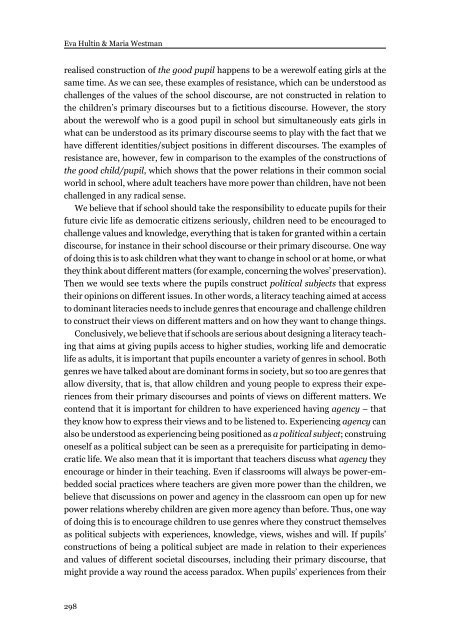Download issue - Umeå universitet
Download issue - Umeå universitet
Download issue - Umeå universitet
You also want an ePaper? Increase the reach of your titles
YUMPU automatically turns print PDFs into web optimized ePapers that Google loves.
Eva Hultin & Maria Westman<br />
realised construction of the good pupil happens to be a werewolf eating girls at the<br />
same time. As we can see, these examples of resistance, which can be understood as<br />
challenges of the values of the school discourse, are not constructed in relation to<br />
the children’s primary discourses but to a fictitious discourse. However, the story<br />
about the werewolf who is a good pupil in school but simultaneously eats girls in<br />
what can be understood as its primary discourse seems to play with the fact that we<br />
have different identities/subject positions in different discourses. The examples of<br />
resistance are, however, few in comparison to the examples of the constructions of<br />
the good child/pupil, which shows that the power relations in their common social<br />
world in school, where adult teachers have more power than children, have not been<br />
challenged in any radical sense.<br />
We believe that if school should take the responsibility to educate pupils for their<br />
future civic life as democratic citizens seriously, children need to be encouraged to<br />
challenge values and knowledge, everything that is taken for granted within a certain<br />
discourse, for instance in their school discourse or their primary discourse. One way<br />
of doing this is to ask children what they want to change in school or at home, or what<br />
they think about different matters (for example, concerning the wolves’ preservation).<br />
Then we would see texts where the pupils construct political subjects that express<br />
their opinions on different <strong>issue</strong>s. In other words, a literacy teaching aimed at access<br />
to dominant literacies needs to include genres that encourage and challenge children<br />
to construct their views on different matters and on how they want to change things.<br />
Conclusively, we believe that if schools are serious about designing a literacy teaching<br />
that aims at giving pupils access to higher studies, working life and democratic<br />
life as adults, it is important that pupils encounter a variety of genres in school. Both<br />
genres we have talked about are dominant forms in society, but so too are genres that<br />
allow diversity, that is, that allow children and young people to express their experiences<br />
from their primary discourses and points of views on different matters. We<br />
contend that it is important for children to have experienced having agency – that<br />
they know how to express their views and to be listened to. Experiencing agency can<br />
also be understood as experiencing being positioned as a political subject; construing<br />
oneself as a political subject can be seen as a prerequisite for participating in democratic<br />
life. We also mean that it is important that teachers discuss what agency they<br />
encourage or hinder in their teaching. Even if classrooms will always be power-embedded<br />
social practices where teachers are given more power than the children, we<br />
believe that discussions on power and agency in the classroom can open up for new<br />
power relations whereby children are given more agency than before. Thus, one way<br />
of doing this is to encourage children to use genres where they construct themselves<br />
as political subjects with experiences, knowledge, views, wishes and will. If pupils’<br />
constructions of being a political subject are made in relation to their experiences<br />
and values of different societal discourses, including their primary discourse, that<br />
might provide a way round the access paradox. When pupils’ experiences from their<br />
298

















